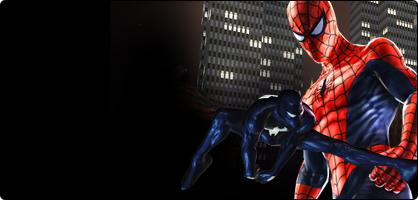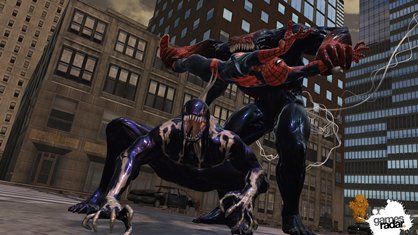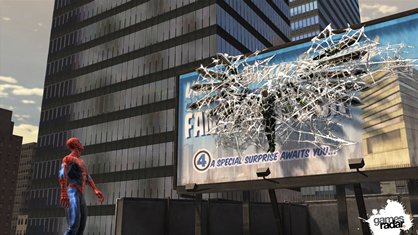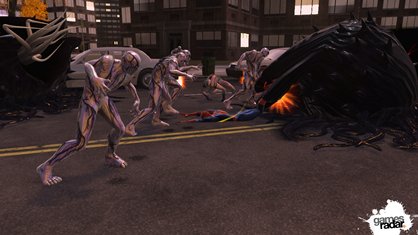How faithful is the next Spider-Man?
We geek test the Web of Shadows team in our EXCLUSIVE interview

Another year, another Spider-Man game. After so many ups and downs in the web-slinging series, should gamers even care anymore?
To find out, we asked one of the guys behind Spider-Man’s latest outing, Web of Shadows. We asked what his team was doing differently, and hopefully better, this time around. With such a massive cast of heroes and villains already announced, we asked how they planned to stay faithful to everyone and everything. And with fans’ expectations both high and low, we asked why this game would be the definitive Spider-Man experience.
Here’s what he had to say... and here’s why you should be excited all over again.
GamesRadar: Starting with the basics, what is the premise of Spider-Man: Web of Shadows?
Tim O’Neil, Lead Gameplay Programmer: At the outset of the game, in a battle with Venom, Spider-Man becomes re-infected with the black suit symbiote. This sets off a sequence of events that result in a massive symbiote invasion. The story unfolds as Spider-Man - along with a few old friends and unlikely new allies - are faced with turning back the tides and saving the day. If that is the route that the player wishes to choose...

GR: How will the experience of playing and controlling Spider-Man differ from previous games?
TO: From the outset we wanted to create a focused, fast paced action game that empowered players to move and fight like Spider-Man and to strip away all the extraneous elements that did not add to this experience.
Sign up to the GamesRadar+ Newsletter
Weekly digests, tales from the communities you love, and more
This top level goal drove us to forgo some of the elements that have been seen in previous games like delivering pizzas, taking photographs, playing as Peter Parker, etc. We then added in a number of new locomotion mechanics, retooled the old ones and took a new approach with the combat and cameras. The locomotion changes revolved mainly around giving the player ways of maintaining and generating momentum as well as new ways of transitioning from one surface to the next in a fluid manner. The new camera, combat and controls were built around the idea of constantly moving into, out of and during battle; continuing fights from the ground to the air, onto the walls and back again, all without getting lost or completely disoriented along the way. This sense of fluid movement interwoven with combat was something that we identified as a central feature of how Spider-Man would fight.
The player is also given the choice of embracing the black suit and employing its powers to their fullest or sticking with his tried-and-true red-and-blue suit or switching back and forth on the fly to create a unique blend of the two styles. This feature both serves as a way for player to customize their experience to be the (anti)hero of their choosing but also gave us room to create a wider array of actions without overcomplicating the control scheme. With each suit having entirely different combat styles and a lot of unique locomotion animations we were able to shoehorn two characters worth of gameplay into one and allow the player to pick and choose between them at the touch of a button.

GR: What inspired Spider-Man’s animation, locomotion and combat moves? What sources did you study for guidance?
TO: First and foremost, we wanted to create an experience that looked and felt like Spider-Man: the way he would move, the way he would fight, the way he would look at the world around him. To this end, our inspirations were spread across a wide spectrum of sources including comics, movies and other video games. We pored through a variety of Spider-Man comics to influence our take on the Wall-crawler’s actions and tried our best to include a lot of the truly iconic poses that the Webhead has struck over the years in all continuities.
In addition to the comics we derived a lot of inspirado from movies like 300 and games like God of War, Tony Hawk, Devil May Cry and Prince of Persia. The discerning eye might even see hints of Street Fighter and Starseige Tribes in the mix as well. It seems like an eclectic mix, but no one game or movie really encapsulated what we were trying to do entirely, so we ended up with a rather diverse list.
GR: How about Manhattan? Are you changing the feel of the city?
TO: Beyond the hero controls themselves, we also spent a huge amount of resources in reworking the city to make it feel responsive and interactive. Just about every object at street level and on the rooftops can be damaged and will react to Spidey’s actions. While these changes aren’t immediately obvious in screenshots, they are an ever-present element that makes the game world feel more immersive and entertaining as you play through the game.
Not only was the city itself rebuilt, but the characters that populate the city were entirely redesigned. The AI characters and mission structure were adapted to accommodate the invasion concept and to be able to provide the hero with a huge field of enemies. At the beginning of the game, the city looks and feels like a normal city with bad guys appearing every now and then; before long, the streets are filled with crime on every block and, eventually, Manhattan is completely overrun by hundreds of symbiote-powered monsters everywhere.



